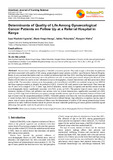| dc.identifier.citation | Isaac Machuki Ogoncho, Blasio Osogo Omuga, Sabina W akasiaka, Margaret Muiva. Determinants of Quality o f Life Among Gynaecological Cancer Patients on Follow Up at a Referral Hospital in Kenya. American Journal of Nursing Science . Vol. 4, No. 3, 2015, pp. 127-130. | en_US |
| dc.description.abstract | Various factors influence the quality of life (QOL)
in cancer patients. This study sought to determine
the predictors
and factors associated with quality of life among g
ynaecological cancer patients on follow up at Kenya
tta National Hospital,
Kenya. A cross-sectional descriptive study was carr
ied out between April and June 2014, involving both
outpatient and inpatient
gynaecological cancer patients receiving care at th
e palliative care unit. A structured questionnaire
adopting the Missoula Vitas
Quality of Life Index was used to collect informati
on on socio-demographics, clinical characteristics
and their perceptions about
quality of life. The association between socio-demo
graphic and clinical factors with QOL was analyzed
using one way ANOVA
and linear regression analysis to identify the pred
ictors of QOL. A total of 108 study patients were i
nterviewed. Their mean age
was 48 years with a range of 18 to 72 years. Age, l
evel of education, marital status, occupation and m
onthly income were the
socio-demographic factors significantly associated
with QOL scores, (p<0.05). The patients’ type of ca
ncer, type of cancer
treatment, duration of illness and palliative care
services were the clinical characteristics signific
antly associated with QOL
scores, (p<0.05). Age, level of education, occupati
on, average monthly income, type of cancer treatmen
t, duration of illness and
type of cancer were the independent predictors of Q
OL. Vulnerable patients were those who were less ed
ucated, peasant farmers
or casual workers, had a long duration of illness a
nd underwent combined therapy. Age, education, occu
pation, income, type of
cancer, type of cancer treatment and duration of il
lness were the determinants of quality of life amon
g gynaecological cancer
patients in the study. Sufficient attention should
be given to the more vulnerable gynaecological canc
er patients in identifying and
addressing their specific needs by the palliative c
are team | en_US |

